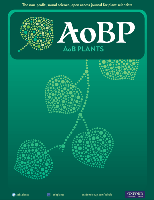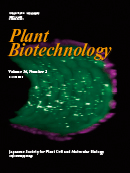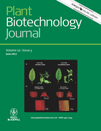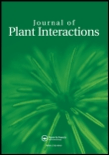
Frontiers in Plant Science
Scope & Guideline
Elevating plant science through open access and collaboration.
Introduction
Aims and Scopes
- Plant Physiology and Development:
Research focusing on the physiological processes in plants, including growth, development, and responses to environmental stimuli. This includes understanding hormonal regulation and metabolic pathways. - Genetics and Genomics:
Studies involving genetic mapping, genome-wide association studies (GWAS), and functional genomics to identify and characterize genes related to important agronomic traits. - Plant-Microbe Interactions:
Investigation into the interactions between plants and their associated microbiota, including beneficial microbes that promote plant health and disease resistance. - Stress Responses and Tolerance Mechanisms:
Research on how plants respond to abiotic stresses such as drought, salinity, and heat, focusing on the molecular mechanisms underlying stress tolerance. - Plant Biotechnology and Genetic Engineering:
Studies employing biotechnology techniques, including CRISPR/Cas9 and transgenic approaches, to enhance crop traits such as disease resistance and stress tolerance. - Sustainable Agriculture and Crop Improvement:
Research aimed at developing sustainable agricultural practices and improving crop varieties to enhance productivity and resilience in changing climates.
Trending and Emerging
- Multi-Omics Approaches:
Increasingly, studies are utilizing integrated multi-omics analyses (genomics, transcriptomics, proteomics, and metabolomics) to provide a comprehensive understanding of plant responses to environmental stresses. - Precision Agriculture Technologies:
The application of UAVs, remote sensing, and machine learning in crop monitoring, disease detection, and yield prediction is rapidly growing, reflecting the technological advancements in agriculture. - Plant-Based Biostimulants:
Research focused on the use of natural biostimulants to enhance plant growth, resilience, and nutrient use efficiency is on the rise, aligning with sustainable agriculture practices. - Genomic Selection and Editing:
There is an increasing trend in the application of CRISPR technology and genomic selection methods to improve crop traits, showcasing the shift towards precision breeding. - Climate Change Resilience Studies:
Research addressing how plants adapt to climate change, focusing on resilience mechanisms and sustainable practices, is gaining importance amid global environmental concerns. - Microbiome Research in Plants:
The exploration of plant microbiomes and their role in promoting plant health and stress tolerance is an emerging field, driven by the recognition of their significance in sustainable agriculture.
Declining or Waning
- Traditional Breeding Methods:
Research related to conventional plant breeding techniques has seen a decline in favor of more advanced genetic engineering and genomic selection approaches. - Basic Plant Taxonomy:
Studies focused solely on the classification and naming of plants without a broader application or relevance to ecological or agricultural practices have become less frequent. - In-depth Ethnobotany Studies:
While ethnobotany remains important, the focus on purely traditional uses of plants without linking to modern applications or sustainability has diminished. - Single-Factor Environmental Studies:
Research that examines the effects of a single environmental factor on plant growth, without considering interactions with other factors or holistic approaches, is becoming less common.
Similar Journals

THEORETICAL AND APPLIED GENETICS
Innovating genetic principles for real-world applications.THEORETICAL AND APPLIED GENETICS, published by Springer, is a premier journal that has significantly contributed to the fields of Agronomy, Crop Science, Biotechnology, and Genetics since its inception in 1933. With a solid reputation reflected in its Q1 ranking across multiple disciplines for 2023, this journal provides a vital platform for the dissemination of high-quality research that advances our understanding of genetic principles and their applications in agriculture and biology. The journal's indexed status and high impact factor indicate its vital role in shaping contemporary genetic research, marking it as an essential resource for researchers, professionals, and students seeking to stay at the forefront of these dynamic fields. Although it currently does not offer Open Access options, the journal ensures that quality studies are accessible through institutional subscriptions, supporting an informed community of scientists dedicated to innovation in genetics and applied biological sciences.

AoB Plants
Fostering collaboration in plant science research.AoB Plants is a distinguished open-access journal published by Oxford University Press, dedicated to advancing the field of plant science. Since its inception in 2009, this journal has played a pivotal role in disseminating high-quality research that encompasses a wide range of topics including plant biology, ecology, and biotechnology. With an impressive impact factor and a ranking in the Q1 quartile for Plant Science, AoB Plants is recognized for its innovative contributions and scholarly rigor, ranking #129 out of 516 in the Scopus Agricultural and Biological Sciences category, placing it in the 75th percentile among its peers. By promoting open-access availability of research findings, the journal empowers researchers and practitioners alike, facilitating greater collaboration and knowledge sharing in the global scientific community. Situated in the heart of the United Kingdom, AoB Plants continues its commitment to providing a platform for pioneering research and developments in plant science, thus fostering a deeper understanding of the crucial roles that plants play in our ecosystems and economies.

Tropical Plant Biology
Unveiling the Secrets of Tropical Plant LifeTropical Plant Biology is a premier academic journal published by Springer, dedicated to advancing the understanding of tropical plants and their ecological significance. With an ISSN of 1935-9756 and an E-ISSN of 1935-9764, this journal serves as a vital platform for researchers, professionals, and students focused on the fields of Genetics and Plant Science. Notably recognized in 2023 as a Q2 journal in Plant Science and Q3 in Genetics, it ranks 171st out of 516 in Agricultural and Biological Sciences and 227th out of 347 in Genetics according to Scopus. The journal encompasses a diverse range of topics, offering insights into tropical plant biology, ecology, conservation, and biodiversity. Although it does not currently operate under an open-access model, it remains an essential resource for anyone passionate about tropical ecosystems and their intricate relationships. With contributions spanning from 2009 to 2024, Tropical Plant Biology continues to foster scholarly discourse and innovation in the field.

Plant Biotechnology
Pioneering Discoveries in Plant Biotechnology.Plant Biotechnology is a distinguished journal published by the Japanese Society for Plant Cell and Molecular Biology, committed to advancing the field of plant biotechnology through the dissemination of high-quality research. With an ISSN of 1342-4580, this journal caters to a global audience interested in agronomy, crop science, and plant molecular biology. The journal has achieved notable rankings, including Q2 in Agronomy and Crop Science and Q2 in Plant Science, underscoring its relevance and impact in these fields according to the latest 2023 metrics. Furthermore, it holds a respectable position within Scopus rankings across multiple categories, indicating its contribution to the academic community. Although it is not an open-access journal, its regular publications, spanning from 1997 to 2024, feature cutting-edge studies that explore innovative approaches and technologies in plant science. Researchers, professionals, and students will find Plant Biotechnology an essential resource for staying informed on significant advancements and trends in plant research.

PLANT BIOTECHNOLOGY JOURNAL
Empowering research to transform agriculture and biotechnology.Plant Biotechnology Journal, published by Wiley, is a premier open-access platform dedicated to advancing the field of plant biotechnology. Since its inception in 2003, this journal has played a pivotal role in disseminating high-quality research that enhances our understanding of plant genomics, biochemistry, and molecular biology. With an impressive impact factor and a prominent position in Q1 quartiles across Agronomy, Crop Science, Biotechnology, and Plant Science, it ranks among the top journals globally, reflecting its significant influence in the agricultural and biological sciences. Researchers and professionals can access cutting-edge studies and reviews that facilitate innovation in sustainable crop production and biotechnology applications. The journal's transition to an open access model since 2016 has further amplified its reach, ensuring that vital research is available to a global audience, promoting collaboration and knowledge sharing within the scientific community.

Nature Plants
Innovating Research to Nourish Our PlanetNature Plants is a premier journal dedicated to the dynamic and interdisciplinary field of plant science, published by NATURE PORTFOLIO in the United Kingdom. With an impressive impact factor placing it in the top tier of scholarly journals—ranking Q1 in Plant Science for 2023—this journal sets a high standard for research dissemination. Nature Plants has maintained a remarkable Scopus Rank of 5 out of 516 in the Agricultural and Biological Sciences category, reflecting its pivotal role in advancing knowledge in the field. The journal aims to provide a platform for groundbreaking research that addresses key challenges in plant biology, ecology, and agriculture, thereby fostering a deeper understanding of plant science's contribution to global sustainability. Although primarily non-open access, it offers exclusive insights and robust discussions, making it an indispensable resource for researchers, professionals, and students eager to explore the latest advancements and innovations in plant science.

Journal of Plant Interactions
Exploring Ecological Connections Through PlantsThe Journal of Plant Interactions, published by Taylor & Francis Ltd in the United Kingdom, serves as a leading open-access platform dedicated to advancing the understanding of plant interactions and their ecological implications. Established in 2005 and transitioning to open access in 2015, this journal focuses on both fundamental and applied aspects of plant interactions, providing invaluable insights for researchers, professionals, and students within the fields of Ecology and Plant Science. With a commendable impact factor and ranked in the second quartile (Q2) for both Ecology, Evolution, Behavior and Systematics and Plant Science, it reflects the quality and relevance of its published research. Researchers aiming to publish innovative studies on plant behavior and ecosystem dynamics will find a welcoming avenue for their work, as the journal is dedicated to fostering open dialogue and sharing knowledge across disciplines.

Plants-Basel
Leading the way in innovative plant research.Plants-Basel is a distinguished open access journal published by MDPI since 2012, offering a comprehensive platform for researchers and professionals in the field of ecology, plant science, and evolutionary biology. Based in Switzerland, this journal has established itself as a leader in disseminating high-quality research, evident through its impressive rankings in multiple categories, including Q1 in Ecology and Plant Science for 2023. With a substantial impact factor and a dedicated focus on advancing our understanding of plant interactions, ecosystems, and sustainable practices, Plants-Basel is vital for scholars seeking to contribute to these critical fields. The journal's commitment to open access enhances visibility and accessibility, facilitating the widespread sharing of knowledge essential for addressing contemporary ecological challenges.

aBIOTECH
Exploring the frontiers of molecular biology.aBIOTECH, published by SPRINGERNATURE, is a premier academic journal dedicated to advancing the fields of biotechnology, agronomy, and molecular biology. With an impressive ISSN of 2096-6326 and E-ISSN 2662-1738, this journal has established itself as a vital resource for researchers and professionals aiming to publish high-quality, impactful studies. Based in Singapore, aBIOTECH has achieved remarkable recognition, boasting a Q1 ranking in multiple categories including Agronomy and Crop Science, Biochemistry, and Genetics in the 2023 Scopus rankings. Its solid position in the 90th percentile for Biochemistry and Genetics reinforces its significance within the global scientific community. The journal covers a broad spectrum of topics relevant to both basic and applied research, facilitating a shared dialogue amongst scientists and encouraging collaborative progress in innovative biotechnological applications. The open-access nature of the journal ensures that cutting-edge research is freely available, fostering a global exchange of ideas that is critical to the advancement of science today.

JOURNAL OF PLANT BIOCHEMISTRY AND BIOTECHNOLOGY
Empowering Agriculture Through Cutting-edge Biochemical ResearchJOURNAL OF PLANT BIOCHEMISTRY AND BIOTECHNOLOGY, published by SPRINGER INDIA, is a leading publication dedicated to advancing research in the fields of plant biochemistry, biotechnology, agronomy, and crop science. With an ISSN of 0971-7811 and E-ISSN 0974-1275, the journal encompasses a wide range of studies aimed at enhancing our understanding of plant biological processes and their applications in agriculture and biotechnology. It has achieved a noteworthy Q2 ranking in Agronomy and Crop Science and Plant Science, as well as a Q3 ranking in Biotechnology, reflecting its quality and relevance in contemporary research. Notably, the journal ranks #166 in Plant Science and #133 in Agronomy, both falling in the top 67th percentile. With a rich history spanning from 1992 to 2024, the journal is committed to providing open access to innovative research findings that bridge the gap between laboratory discoveries and their practical applications in sustainable agriculture. Researchers, professionals, and students will find a wealth of knowledge and inspiration to advance their work in the dynamic field of plant sciences at this esteemed journal.